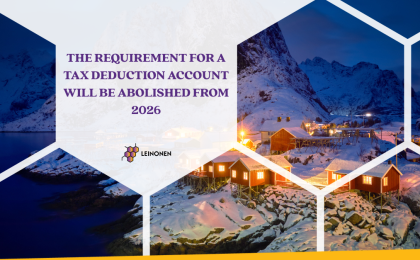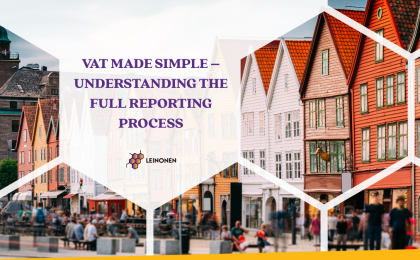COMPANY ESTABLISHMENT
Before undertaking business activity in Norway, it is necessary to choose which type of legal entity to form. Depending on how many employees will be in the company, how much risk you are willing to take and what future plans are, certain legal entities will suit you better than other. Therefore, an investor should pay special attention when determining the appropriate corporate form since this will help to achieve goals that are set while meeting all legal requirements.
The most common legal entities in Norway are:
- sole proprietorship (ENK),
- Norwegian branch of a foreign company (NUF)
- private limited company (AS).
The easiest way to start a company in Norway would be a sole proprietorship (ENK). This is because this legal entity doesn’t require a minimum share capital, and the process of registration is quick. The founder makes all decisions by him/herself and may use the profit after tax return is submitted. Note that the owner has a full financial risk.
Setting up business in Norway is easily done through the Brønnøysund Register Centre. Altinn is the official website that provides all the information for establishing and running a business in Norway. There you can find relevant information and guides about registering your business and operating in Norway.
It is interesting to notice that 68% of all companies in Norway have no registered employees. 16 % of all companies have 1 to 4 employees. So, 84% of all Norwegian companies are small, micro companies. Only 1% are the companies which have between 50 and 99 employees and 0,5% of the market are the companies with 100 to 249 employees. That means that the Norwegian market mostly consists of very small companies.
TAX AND VAT
As a standard, both local and foreign companies established as permanent entities and earning profits from Norway are liable to pay 22% Norwegian corporate tax on earnings. All companies are subject to the same Norwegian corporate tax rate. The tax is called “advance tax” and is usually paid in February and April the year after the profit was earned. Based on the last tax return, the final settlement is usually done in October the year after the accounting year. You can read more about it here.
Most Norwegian companies that sell goods and services must register for VAT, unless they sell something exempt (for instance health and cultural services, teaching) from VAT. Registration needs to be done after sales exceed NOK 50,000 during last 12 months. Other services can be exceptions from VAT (for instance export) the company still needs to do VAT registration and submit VAT reports. The standard VAT rate is 25%. The reduced rate for food and beverages is 15%. For passenger transport and tickets to cinemas, museums, etc. it is 12 % and for raw fish it is 11,11%. Foreign businesses that have VAT-liable turnover in Norway must register in the VAT Register using the same rules as Norwegian enterprises.
ACCOUNTING
When do you have to register your company in Norway?
To start the business activity you need to get the organization number at the Norwegian Register of Business Enterprises. Let’s take a look on 2 most common legal entity types in Norway.
A PRIVATE LIMITED COMPANY (AS)
- minimum share capital 30 000 NOK is required
- accounting from A to Z needs to be done
- VAT report every 2 months needs to be submitted
- full accounting needed
- salaries must be reported in Norway
- risk limited in share capital in Norway
- employees pay tax in Norway
- highly trusted in Norway
A Norwegian branch of a foreign company (NUF)
- VAT report every 2 months
- full accounting needed
- salaries have to be reported in Norway
- risk could reach the mother company in the home country
- in some limited cases it is possible to make an under 6 months installation project, where the company and employees pay tax to the home country
- poorly trusted in Norway, difficult to find clients or partners for cooperation
Private limited company and joint-stock company (AS)
A private limited company is the most common business form in Norway and is usually registered by small and medium businesses. There are approximately 400,000 private limited companies in Norway out of a total 656 000 companies. With this type of legal entity, the minimum share capital is NOK 30,000 (approx. EUR 4,200).
Opening this kind of company is possible with one founder. General meetings and the shareholders make all the major decisions. It is also possible to have several board members and a managing director. The capital of such a company is divided into shares and the decision to transfer these shares can be taken only by the majority of the votes of the board members. It should be noted that when establishing a private limited company, you don’t need to have a board but at least a managing director needs to be appointed.
A joint stock company is a business form mainly for bigger companies. The required capital that is divided into shares cannot be less than NOK 1,000,000 (approx. EUR 83,000). The capital is divided into stocks and can be listed in the stock market. General decisions are made by the general meeting of the shareholders, whereas the daily decisions by the members of the management board.
A Norwegian Branch of a foreign company (NUF)
NUF is a Norwegian branch of a foreign company that is subordinate to a foreign company. The foreign company is responsible for the Norwegian branch, and they must follow Norwegian rules. The branch must assign a contact person or a managing director who has a Norwegian national ID or D-number, there is no requirement that the person must be a resident of Norway.
If you are planning to start a short-term project in Norway NUF might be a suitable choice. Whether NUF is liable to pay taxes to Norway must be assessed case by case. It is possible to pay taxes to the home country only in certain conditions. If an employee has been working in Norway for more than 183 days during the last 12 months, he or she is liable to pay taxes in Norway from the first working day.
Sole proprietorship (ENK)
A sole proprietorship is a company where a private person can register as an entrepreneur. The single-person business is the easiest and cheapest way to start a business in Norway. The main benefits of this form of business are that the registration process is quite quick, the registration price is low (NOK 2, 499 for electronic registration), no share capital is needed and it is easier to take the profit out of the company since there is no need to report any salary as long as there is only one owner without any other employees. However, the entrepreneur does not have the same social benefits as the employee as he/she is not classed as an employee. Sickness benefits are lower, and there are no unemployment benefits. Tax liability must be paid in advance, 4 times a year. This could cause cash-flow problems in the starting phase. The owner has full personal liability, including all debts. This form fits best for very small businesses, where the risks are low.
For more information, please take a look here.
What we advise
In general, we recommend a private limited company (AS) in most cases for someone who wants to start a company in Norway. This is because such companies have a better reputation and are more trusted in Norway among clients and suppliers. We have a lot of experience working with private limited companies and can offer you valuable advice.
Audit
For small companies, the auditor is usually not necessary. The audit is only needed when yearly turnover exceeds NOK 7,000,000 NOK, balance sheet assets amount is more than NOK 27,000,000 and the average number of employees reaches 10. It is called “opting out of audit”.
Employees
In Norway, there is no general minimum wage except for certain sectors. You can find more information regarding these sectors here.
Starting from 1st July 2024 new requirements to the employee contracts have entered into force. These contain more detailed information regarding employees’ rights and obligations. An employment contract must always be written. Employees must apply for a tax deduction card, which shows how much their employer must deduct before the salary is paid. The tax deduction will be 50% of the salary if the employee does not have a tax card.
Prices for registration of a company
For AS registration, the Norwegian government agency charges NOK 7,653 (NOK 6,500 for electronic registration). Electronic registration is possible if board members have a Norwegian identification number. For NUF registration, the Norwegian government agency charges NOK 3,925. The Leinonen office charges a fixed price of 25,000 NOK (+25% VAT) for the establishment process, including the application for a D-number.
EMPLOYMENT
The Working Environment Act regulates working life in Norway. It contains information about the working environment, working hours, and everything else that is a part of the relationship between employers and employees. The purpose of the Working Environment Act is to ensure safe employment conditions and equal treatment in working life.
Foreign workers are liable to pay Norwegian taxes and social charges always if they stay in the country for more than 183 days for 12 months. Your employer will typically arrange the registration with the Norwegian tax office and secure the social security number. Self-employed workers will need to arrange their tax registration and Norwegian social security number by themselves. Norwegian tax will be deducted from the gross salary of the employer.
Termination of the employment agreement at the probation period by the employee or employer may be carried out by providing two weeks’ written notice. After the probation period, it is much harder for an employer to cut the agreement.
PAYROLL
When is salary paid
Unless otherwise agreed, the salary usually is paid once a month. The time of payment of salary shall be in the employment contract. When paying salary, the employer must provide you with a paycheck that describes salary, tax deductions and any other deductions and additional benefits (mobile, Internet, etc.) If you do not get this, you need to ask your employer.
Vacation
All employees are entitled to at least 25 business days of holiday each year. Business days includes Saturdays. Sundays are not considered working days. Normally, six business days will correspond to one week. The employee thus has a requirement of four weeks and one day of holiday each calendar year. The holiday pay rate in this case will be 10,2 % of last year’s income.
The tariff settlement 2000/2001 gave many workers a fifth holiday week. This extra holiday also increases the holiday pay rate from 10,2% to 12 %.
Employees who reach the age of 60 during the holiday year are entitled to 1 week extra holiday and a 12,5% or 14,3% holiday pay base. You decide for yourself when you take this extra holiday, but you must notify the employer at least two weeks in advance.
Holiday Pay
As we just mentioned, holiday pay is earned the year before you take out your holiday, and this is called the earning year. If you haven’t worked the year before, you have the right to take a holiday anyway. But then you are not entitled to holiday pay.
Not all payments are included in the calculation. For example, holiday pay shall not be calculated on payments relating to travel expenses, lodging, holiday pay paid during the earning year, or share of net dividends. Holiday pay from bonus and commission-based salary shall be calculated when this remuneration is a result of personal work effort.
Payroll Taxation
Every employee in Norway has an individual tax percentage or a tax card which the tax is calculated from. The percentage or the tax card depends on salary level. The tax is progressive. With low income, you get a lower tax, and thus with higher income, you get a higher tax.
Employers are demanded to deduct a deposit tax from Gross salary and pay only net salary to the employee. The deposit tax must each payroll be transferred to a special tax account and paid further to the tax authorities bi-monthly.
On salary, there are also employer’s national insurance contributions of 14,1% in general (some lower percentage in rural areas). Every employer is required to pay this tax bi-monthly to the tax authorities if there is payroll in the company.
A mandatory occupational pension scheme must also be added to each employee’s salary. The minimum is 2% of the employee’s salary.
A-REPORT
The A-report is a monthly report from the employer to NAV, Statistics Norway and the Tax Administration on employees’ salaries, working conditions and withholding tax, as well as the employer’s national insurance contributions and financial tax for the company.
Anyone who has employees, or pays salary or other benefits, must submit a notification. It is important to remember that even though the employee doesn’t receive any salary for some period of time, the A-report still needs to be submitted by the employer. It is called “0-message”.
The A-message contains information on salaries and benefits, in addition to the status of all working conditions
The due date for A-report is the 5th of the month after the payroll.
FOREIGN WORKERS
The citizens of the member states of the European Union and the European Economic Area have the right to work in Norway. Registration is not necessary for those who come from Sweden, Denmark, Island and Finland. Workers from other EU/EEA need to register themselves with the police during the first 3 months in Norway. You can find more information here.
As a general rule foreign workers living or working in Norway are obliged to pay taxes and contributions to the Norwegian social security system. It entitles to certain Norwegian social welfare benefits, such as unemployment benefits, basic healthcare in Norway, maternity and child benefits, and a Norwegian pension.
Note that if a foreigner works in Norway over 183 days during 365 days or 270 days during 3 years, he/she will have a tax obligation to Norway from the first day in Norway.





